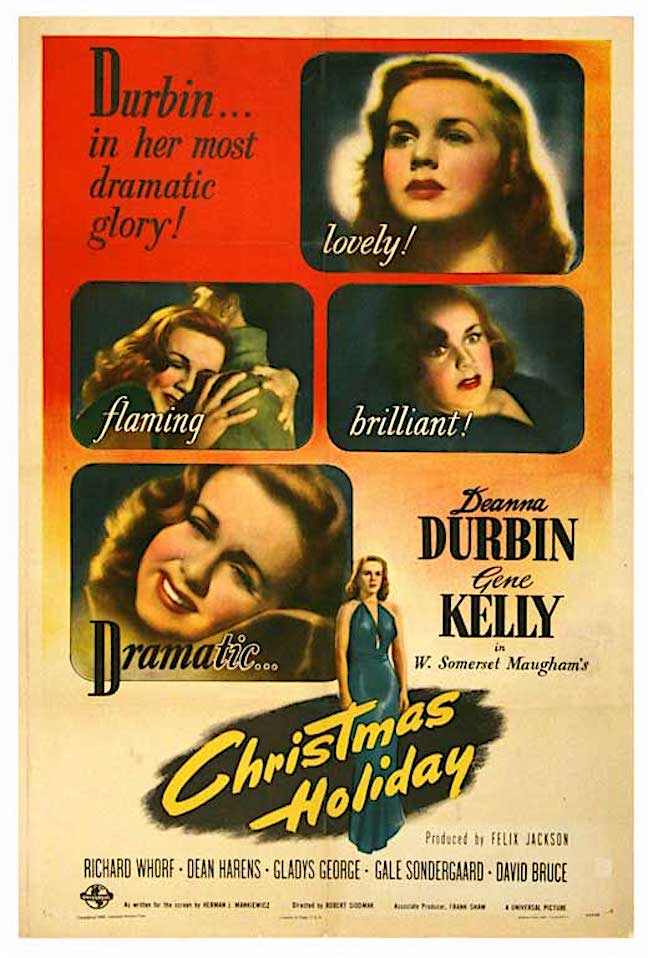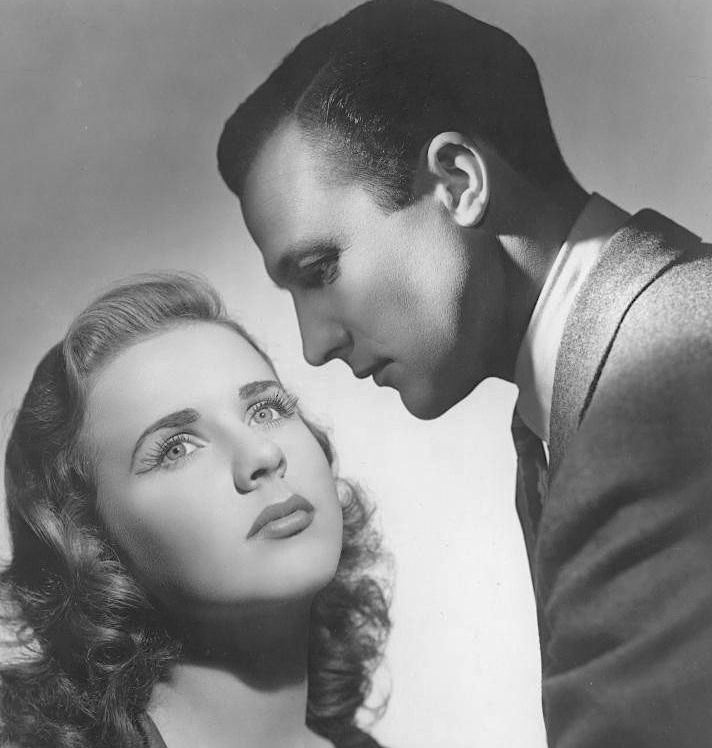
Love…was her crime! Love…was her punishment!

CHRISTMAS HOLIDAY is Based on the screenplay by W. Somerset Maugham and the novel by Herman J. Mankiewicz and directed by the underrated Robert Siodmak who directed two of the most powerful film noirs of the 1940s- Phantom Lady 1944, The Strange Affair of Uncle Harry 1945, The Spiral Staircase 1946, The Dark Mirror 1946 and The Killers 1946.
Starring Deanna Durbin, Gene Kelly, Dean Harens, Gail Sondergaard who brings that signature artfully subdued menace (The Letter 1940, The Spider Woman Strikes Back 1946) , Gladys George and Richard Whorf.
It’s Christmas Eve and Army Lt. Charles Mason’s (Dean Harens) flight to San Francisco is forced to land in New Orleans. He is forced to spend a lonely Christmas there after receiving a telegram from his fiancée Mona that she has married another guy. Lt. Mason is heartbroken after being dumped and stranded by the bad weather. He winds up at a nightclub/brothel run by the amiable Valerie De Merode (Gladys George) where he meets sultry singer Deanna Durbin, named Jackie Lamont. Richard Whorf plays reporter Simon Fenimore who first introduces Jackie to Lt. Mason. Simon tells Jackie- “Isn’t that the way things always seem to happen. You’re getting along alight and suddenly boom! you have to make a forced landing.”
Jackie asks Lt. Mason if he’ll take her to midnight Mass, where she begins to break down. Jackie begins to to relate her story told in flashback of how she wound up feeling so despondent. Her real name is Abigail Martin/Mannette from Vermont. She tells him how she fell in love and married Robert Mannette a charming but troubled gambler with an Oedipal complex who is ruled over by his domineering and overly protective mother (Gail Sondergaard).
Jackie/Abigail tells Lt. Mason “He was so gay, so charming, so different.”
The newlyweds spend six months in bliss until Robert’s weakness and violent tendencies lead him to be arrested for the murder of his bookie.
Overnight their life changes. Robert comes home with an unexplained wad of cash and blood on his trousers, which his mother quickly burns in the incinerator out back, telling Abigail it’s her old dress she’s tired of. Lying to protect her son, all the time knowing he’s done something horrible, she even sews the cash inside the seams of the curtains. But Abigail burns the money before the police come with their search warrant.
Abigail calmly- “I burnt the money mother.” Mrs. Mannette-“Abigail I swear to you by all my love for him and for you that Robert did not kill Teddy Jordan.” Abigail-“You know, and I know mother… that he did.” Mrs. Mannette turns on Abigail maniacally –“Are you going to turn against him too. From the day you married him, I think now from the day you met him, you closed your eyes to what it was all about, to what he was all about. Selfishly just so you could be happy. He needed your strength that’s why I let him marry you. And all you gave him back was his own weakness!”Â
“I love Robert” Mrs. Mannette- “No you don’t. It’s I who love him and keep on loving him.”
The film has a creeping sinister Siodmak atmosphere with it’s dark spaces and psychological narrative. Sondergaard hovers over the house like a lurking spider knitting a web of preservation for her son.
In a telling scene she gives her blessing to Abigail to marry her son thinking that she will be his strength and keep him out of trouble and make him, “stronger”.
Mrs. Mannette-“Just one last thing. I want to be completely honest with you. There are certain traits in Robert that you may not… they’re nothing really evil. Believe me. He just sometimes forgets his sense of responsibility, that’s all. And that’s why I’m so glad that you’re the kind of person you are. Between us, we will make him strong.”
As the the story unwinds, and Robert winds up in prison doing a life sentence, Mrs. Mannette blames her daughter in law for making Robert weak. Mrs. Mannette, “You killed him!!!”
Abigail feeling guilty about failing her husband, throws herself into self imposed exile by taking up at the bordello filled with self hatred and longing for Robert.
Jackie/Abigail tells Lt. Mason as he walks up and down the hotel room, thinking about Mona in San Fransisco,- “What is there about pacing back and forth like a caged lion that makes a man feel better? I tried it myself once didn’t do me any good.”
Once Jackie/Abigail finishes her story to Lt. Mason, the two part wishing each other luck. But the story does not end there. The beauty of the film is partly the lead actors being cast as doomed lovers both doing a fabulous job at playing against type. The music throughout the film is wonderful, in particular Durbin’s moving rendition of Irving Berlin’s Always, and the simply beautiful song I’ll Remember April performed as background music by the nightclub band.
Here it is December 17th and a perfect time to publish a tribute to this taut little noir gem that was originally performed on “Lux Radio Theater” broadcast a 60 minute radio adaptation of the movie on September 17, 1945 with Loretta Young as Jackie/Abigail, William Holden as Lt. Mason, and David Bruce as Robert Manette.
Screenwriter Herman J. Mankiewicz changed the setting from a Paris brothel to a nightclub in New Orleans and the main character was changed from a prostitute to a more ambiguous nightclub singer and hostess, when adapting the 1939 novel of the same name by W. Somerset Maugham, due to the Hays Code.